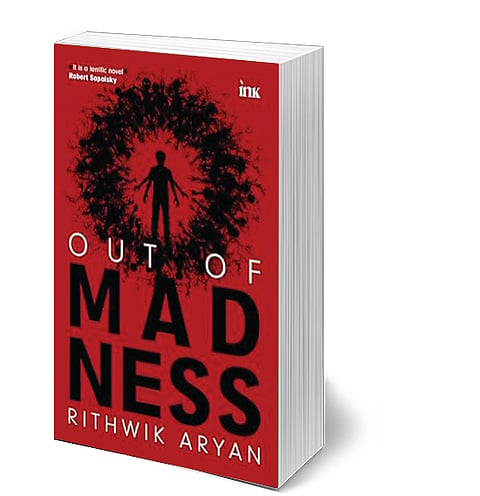

Reading Rithwik Aryan’s Out of Madness is an experience in itself. The author has said in multiple interviews that he spent 18 months in India’s major mental asylums—the Central Institute of Psychiatry (CIP) in Ranchi and the Institute of Mental Health and Hospital in Agra—to write this book. This, if true, in itself is an exciting premise for the novel.
Out of Madness has a protagonist named Mason Moron, a young, wayward man with a challenging childhood who ends up doing things that make the narrative gripping. Mason is a young psychology professor at Nalanda University who fakes his death and disappears after his wife cheats on him and refuses to have sex with him. Like his mother, who forgave his father when he cheated (with an underage girl), Mason forgives his wife too. But he couldn’t suppress his libido and fled, and madness ensued.
It sounds crazy, as it is. The story takes an unexpected turn when he encounters a mad politician, Anand Thakur, known as Bahubali, who wants to make a porn film. Their journey leads them to a mental asylum, where Mason meets Ms Staci, a beautiful actress, with whom he falls in love. The novel then takes another direction
The setup and syntax of the novel are phenomenal, except for the flow. Although the author has written it in a first-person narrative and the protagonist’s psyche is dwindling, the confusion in the novel is therefore expected and a necessity. Still, it is somewhat difficult for the novel to hold the reader’s attention and follow the thread.
Nevertheless, this psychological thriller is definitely a wonderful read for those looking to explore themes like madness. Lunacy and madness are difficult themes, and rarely does a writer choose to write on them. This, therefore, is equally exciting as a young author bringing something new to the themes of madness and thriller.
The book’s vocabulary, rooted in pop psychology, adds to its appeal. Terms like Oedipus complex, psychoanalysis, childhood trauma are part of pop psychology that young people talk about (even though not all understand them fully, but many use them in their conversations). One example is Mason’s self-description, “Most of the crimes I will be convicted of committing in the near future might end up being psychoanalysed as various imbalances of libido.”
Aryan’s lack of inhibition in describing carnal desires, sexual fantasies, and intrusive thoughts is absolutely phenomenal. One can even read this novel for the author’s daring and badass writing style. Although the novel has its flaws, if you can handle those minor hiccups, it is one of the most thrilling experiences to read.